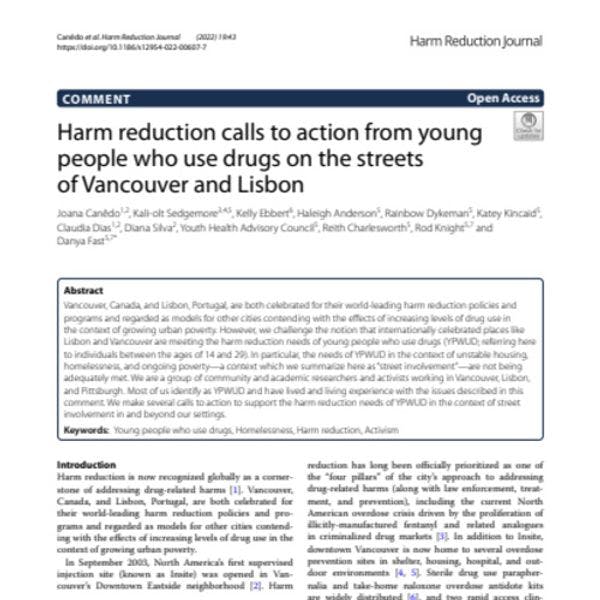Harm reduction calls to action from young people who use drugs on the streets of Vancouver and Lisbon
By Joana Canêdo, Kali-olt Sedgemore, Kelly Ebbert, Haleigh Anderson, Rainbow Dykeman, Katey Kincaid, Claudia Dias, Diana Silva, Youth Health Advisory Council, Reith Charlesworth, Rod Knight and Danya Fast / Harm Reduction Journal.
Harm reduction is now recognized globally as a cornerstone of addressing drug-related harms. Vancouver, Canada, and Lisbon, Portugal, are both celebrated for their world-leading harm reduction policies and programs and regarded as models for other cities contending with the effects of increasing levels of drug use in the context of growing urban poverty.
In September 2003, North America’s first supervised injection site (known as Insite) was opened in Vancouver’s Downtown Eastside neighborhood. Harm reduction has long been officially prioritized as one of the “four pillars” of the city’s approach to addressing drug-related harms (along with law enforcement, treatment, and prevention), including the current North American overdose crisis driven by the proliferation of illicitly-manufactured fentanyl and related analogues in criminalized drug markets. In addition to Insite, downtown Vancouver is now home to several overdose prevention sites in shelter, housing, hospital, and outdoor environments. Sterile drug use paraphernalia and take-home naloxone overdose antidote kits are widely distributed, and two rapid access clinics provide low-barrier access to medication-assisted treatment, including opioid agonist therapy (OAT; e.g., methadone, buprenorphine-naloxone), injectable OAT (titrated daily witnessed injected doses of diacetylmorphine or hydromorphone), and prescription opioids (e.g., hydromorphone tablets) and stimulants (e.g., dextroamphetamine tablets). The latter are “risk mitigation” prescriptions that were introduced during the COVID-19 pandemic to allow people who use drugs to better self-isolate, and avoid withdrawal and overdose while doing so. Drug checking services are also increasingly available in Vancouver.
Portugal decriminalized the use, acquisition, and possession of all drugs in 2000, moving towards a public health approach that integrated harm reduction, prevention, dissuasion, treatment, and reintegration. In Vancouver, there have been growing calls for the decriminalization of substance use, including recent protests during which tested, unadulterated heroin, crystal methamphetamine (meth), and cocaine were distributed to people who use drugs. In Lisbon as in Vancouver, there have been concerted efforts to draw people who use drugs into a continuum of care that ranges from the provision of sterile drug use paraphernalia to OAT (primarily methadone in this context) to abstinence-based residential drug treatment. In Lisbon, harm reduction programs are delivered via mobile units and outreach teams and in community health and drop-in centers and shelters. The first mobile drug consumption room was opened in Lisbon in 2019. In 2021, twenty years after the start of decriminalization, the first safer smoking and injection sites were opened in Portugal. While drug checking services have been available at music festivals for some time in this setting, they were made more widely available through a twice weekly drop-in program and mobile unit in Lisbon in 2019 and 2022, respectively.
In Vancouver and Lisbon, drug user activists and their allies have waged fierce battles for these policy reforms. There is no question that hard-won interventions like syringe exchanges, low-barrier OAT programs, peer-to-peer overdose prevention (naloxone) programs, and drug consumption sites save lives. However, we challenge the notion that internationally celebrated places like Lisbon and Vancouver are meeting the harm reduction needs of young people who use drugs (YPWUD; referring here to individuals between the ages of 14 and 29).In particular, the needs of YPWUD in the context of unstable housing, homelessness, and ongoing poverty—a context which we summarize here as “street involvement”for the sake of brevity—are not being adequately met.
We are a group of community and academic researchers and activists working in Vancouver, Lisbon, and Pittsburgh. Most of us identify as YPWUD and have lived and living experience with the issues described in this comment. Several of us are playing an active role in shaping harm reduction in Vancouver and Lisbon. For example, one of us developed a youth-specific intake form for overdose prevention and safer injecting sites in Vancouver and has been active in advocating for a safe supply of drugs for YWPUD as part of the Vancouver Area Network of Drug Users (VANDU), Drug User Liberation Front (DULF), and Coalition of Peers Dismantling the Drug War (CPDDW)’s protests, during which tested, unadulterated heroin, meth, and cocaine were distributed to people who use drugs. Others of us have long been advocating for the greater availability of harm reduction information and peer-led harm reduction services through networks such as Youth RISE and EuroNPUD. We have served as peer navigators for the first mobile drug consumption room that opened in Lisbon in 2019. One of us started the peer-led group MANAS in Lisbon, which includes young people. MANAS provides a space for women and non-binary people who use drugs and are experiencing violence and other intersecting vulnerabilities to come together and engage in artistic and wellness practices, provide mutual support, and access harm reduction supplies as well as sexual and reproductive health care, food, and clothing. It is informed by a commitment to fostering solidarity and engagement and recognizing intersectionality. The individuals involved in this group include those who are involved in sex work, living with HIV, and racialized, many of whom are navigating the institutional violence of child apprehensions. MANAS allows YPWUD to gather, imagine different futures together, and plan direct actions such as fighting for a permanent 24-h peer-run drop-in space.
